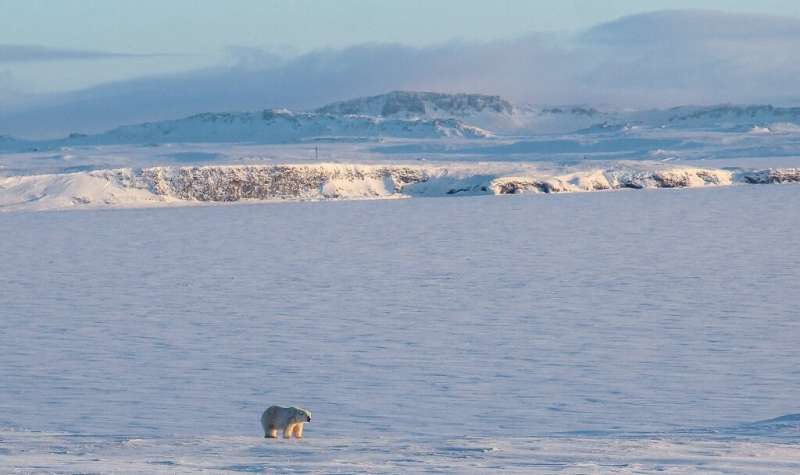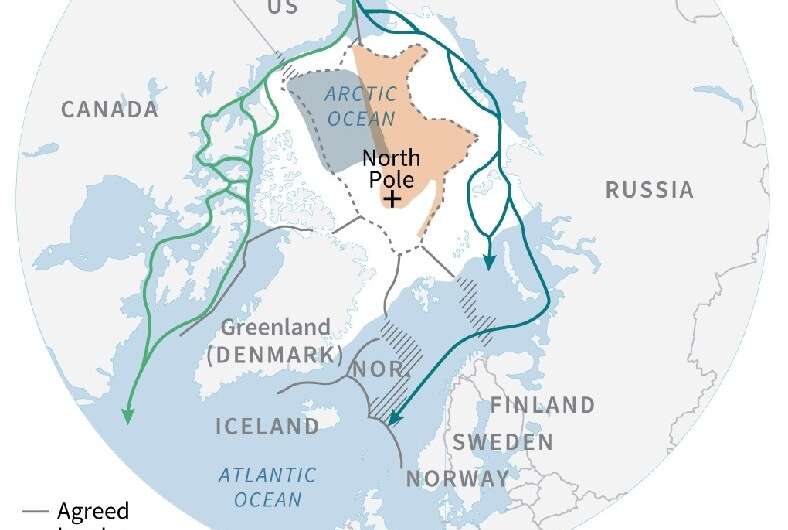Why Is Climate Change More Rapid In The Arctic Than Elsewhere?

The Arctic has warmed three times more quickly than the planet as a whole, and faster than previously idea, a report warned on Thursday.
Chill sea ice looks set to be an early on victims of rising temperatures, with each fraction of a degree making a large difference: the chance of it disappearing entirely in summertime is x times greater if Earth warms past ii degrees Celsius to a higher place pre-industrial levels compared to 1.5C, the goal set past the 2015 Paris Accordance.
The alarming finding comes from the Arctic Monitoring and Assessment Plan (AMAP) in a study timed to coincide with a ministerial meeting this week of the Arctic Council in Reykjavik, which gathers countries bordering the region.
"The Chill is a real hotspot for climate warming," said Jason Box, a glaciologist at the Geological Survey of Denmark and Greenland.
In less than half a century, from 1971 to 2019, the Arctic'southward boilerplate annual temperature rose by iii.1C, compared to 1C for the planet equally a whole.
That'south more than previously suspected. In a 2019 report on Earth'southward frozen spaces, the UN's Intergovernmental Console on Climate Change (IPCC) concluded that Arctic surface air temperature has likely increased "past more than double the global average".
Forest fires
According to researchers, a turning point came in 2004 when the temperature in the Chill surged for largely unexplained reason.
Since then, warming has continued at a rate 30 percent higher than in previous decades.
The region is now experiencing "more and longer lasting winter warm events," Box told AFP.
During the summer months from June to September, there is added rut from the ocean, which is increasingly complimentary of ice and the insulation it provides.
And the warming is not coming to an end any fourth dimension soon.
According to forecasts in the written report, by the finish of the century average temperatures in the Arctic are expected to rise iii.3 to 10 degrees to a higher place the average for the period 1985-2014.
The final effigy depends on how rapidly humanity draws down greenhouse gas emissions.

Warming has firsthand consequences for the Arctic ecosystem, including changes in habitat, food habits and interactions between animals—including the iconic polar deport—and the migration of some species.
From Siberia to Alaska, forest fires have too become a problem.
"This is what 3C looks like, it's not only numbers, it's forests on burn down," said Box.
"The impacts of wild land fires are not express to public prophylactic concerns, such as protecting life and property," said U.s.a. researcher Michael Young, Arctic Quango Wildland Fire Projects Coordinator.
"The smoke they produce also contains carbon dioxide and black carbon, which both contribute to climate alter."
Global affect
The consequences are too dramatic for the four one thousand thousand people who live in the region, specially ethnic peoples.
"Hunters in northwestern Greenland report that the flow when travel past canis familiaris sleds on sea ice is possible has decreased from five to three months," said Sarah Trainor, managing director of the Alaska Center for Climate Cess and Policy.
"Ethnic hunters and fishermen in Canada and Russia take reported thinner seals, decreased health of wild animals and a greater prevalence of worms in fish and bounding main mammals," she added.
A warmer Arctic is besides more than humid, with rain replacing snow.
"Reindeer herders in Fennoscandia (Finland and Scandinavia) and Russia accept experienced major losses in their herds due to extreme snow and rain-on-snow events," added Trainor, as layers of frozen rain forestall reindeer from reaching the lichen they eat.
"No one on Earth is immune to Arctic warming," the AMAP study said, noting its furnishings were felt far and wide.
The melting of hundreds of billions of tonnes of ice each twelvemonth in Greenland leads to rising sea levels, which endanger the lives of people living thousands of kilometres away.
The receding ice has opened upwardly economic opportunities—oftentimes to the dismay of ecology activists—including new fishing zones, new commercial aircraft routes, and easier access to potential mineral and oil and gas resources.
However, notes Trainor, "the potential for expansion of these industries is tempered past efforts to limit greenhouse gas emissions and attain goals established under the Paris Agreement."
© 2021 AFP
Citation: Chill warming iii times faster than the planet, report warns (2021, May xx) retrieved 16 March 2022 from https://phys.org/news/2021-05-arctic-faster-planet.html
This document is subject to copyright. Apart from whatever off-white dealing for the purpose of private study or enquiry, no part may be reproduced without the written permission. The content is provided for information purposes simply.
Source: https://phys.org/news/2021-05-arctic-faster-planet.html
Posted by: steeleconswited1948.blogspot.com


0 Response to "Why Is Climate Change More Rapid In The Arctic Than Elsewhere?"
Post a Comment